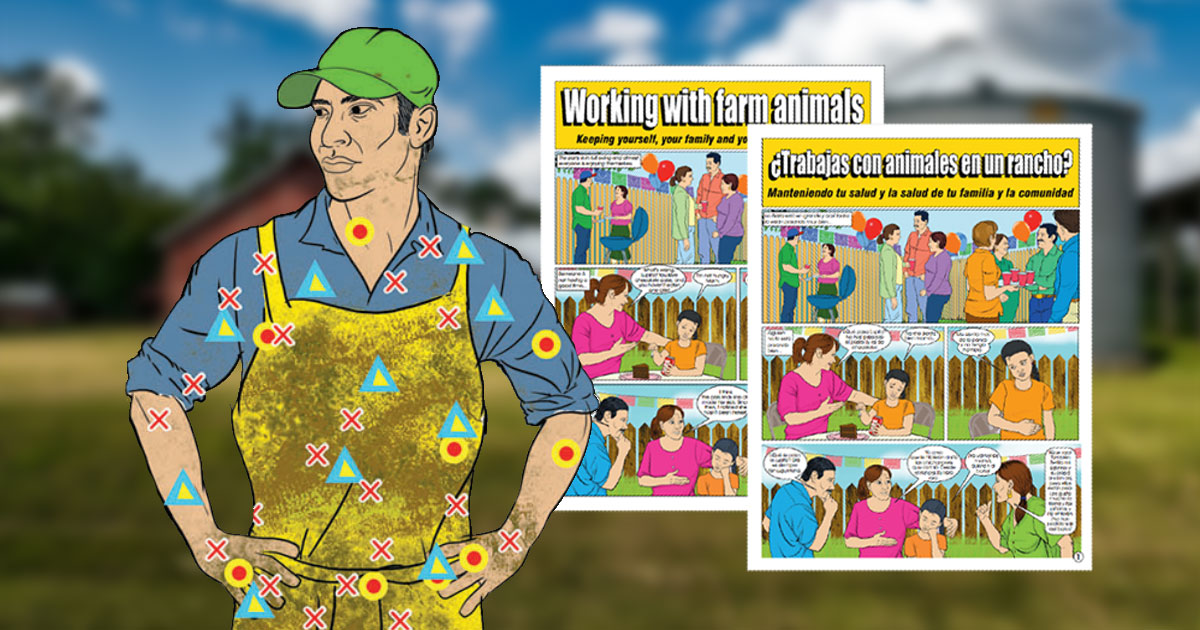- Who We Are
- Clinician Employment
- Publications
- Witness to Witness (W2W)
- Kugel & Zuroweste Health Justice Award
- Your Voice Matters: Photovoice Project
Clinical Guidance for Carbon Monoxide (CO) Poisoning After a Disaster
A resource by the CDC highlighting the symptoms and signs of carbon monoxide poisoning, which is often a cause of illness and death after a natural disaster.
MCN COMIC: Working with Farm Animals: Keeping Yourself, Your Family, and Your Community Healthy

Bilingual educational comic book about ways to prevent zoonotic diseases. Developed by MCN in partnership with The Ohio State University.
Files
-
- Working with farm animals ( 14 Mb )
-
- Trabajas con animales en un rancho ( 14 Mb )
RTMCC: Global Tuberculosis Institute at Rutgers, The State University of New Jersey
Confidential/Confidenciales Clinic Poster
This poster was adapted from one made by the Bluegrass Farmworker Health Program. Division of Viral Hepatitis Education and Training staff worked with an illustrator to take the concept and made this beautiful bilingual poster. You can print this on your office printer and use in your clinic!
Reporting Pesticides in California
Any CA clinician that suspects a patient is suffering from pesticide poisoning must contact their local county health officer by telephone within 24 hours. Use this link to access all forms and numbers to report and incidnet in CA.
Pesticides & Health Series 2008
Pesticide training for the primary care provider via video conference from UC Davis. Sign up for the next training or review archives at this link.
Farmworkers, Pregnancy and Pesticides
Palm Beach Post’s page Farmworkers and Pesticides. Excellent artilces on Florida's farmworkers, with special attention to pregnant farmworkers and birth defects.
Breathing Easy at Home/Una Casa Libre de Problemas Respiratorios
Educational comic book about the sources of indoor pollution and ways to minimize exposure. Offers safe alternatives to clean homes. English and Spanish.
Pesticide Exposure Reporting Form
A useful generic form to document pesticide expsosures in farmworkers. For use in states and counties that do not have specific reporting forms.
Reporting Pesticides in North Carolina
North Carolina now has a mandatory reporting rule for clinicians. Follow this link to easily report pesticide exposure in North Carolina.
Questions and Answers: Prevention of Hepatitis A after Exposure to Hepatitis A Virus and in International Travelers: Updated Recommendations of the Advisory Committee on Immunization Practices (ACIP)
This document answers commonly asked questions about the revised guidelines.
Vaccine Equivalency Chart: Mexico and Arizona
A comparison of Mexico's Immunization Schedule and the U.S. C.D.C. recommended schedule from US and Mexico Border Health Comission, Arizona Delegation
Hepatitis Web Study
From the Seattle STD/HIV Prevention Training Center and the University of Washington. This excellent site provides interactive, case-based modules related to the clinical care of persons with Viral Hepatitis A, B, and C. Easy to access!
A Comprehensive Immunization Strategy to Eliminate Transmission of Hepatitis B Virus Infection in the United States Part II: Immunization of Adults
MMWR 2006,55(No. RR-16) Please note: Be sure to include the 3 appendices to get the complete document.
Update: Prevention of Hepatitis A After Exposure to Hepatitis A Virus and in International Travelers. Updated Recommendations of the Advisory Committee on Immunization Practices (ACIP)
MMWR October 19, 2007 / 56(41);1080-1084 (See separate resource listing and link for Q&A about these new recommendations.
A Guide to Integrating Community Health Workers into Health Disparity Collaboratives
The first section of the document is tailored to each Collaborative Topic (diabetes, cancer, etc.) with suggestions for how CHWs can promote significant outcomes within a variety of measures. The second section includes a grid describing roles for CHWs in five of six components of the Chronic Care Model, aligned with already-established Change Concepts such as "Set and document self-management goals collaboratively with patients." For each Change Concept, a number of high-potential Change Ideas are presented.




